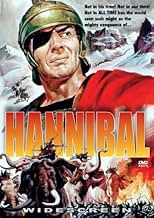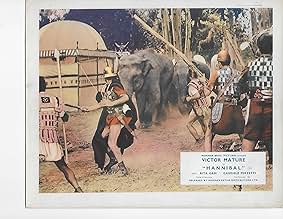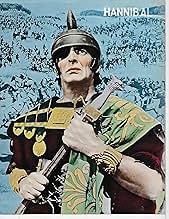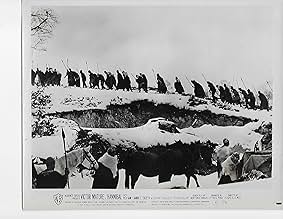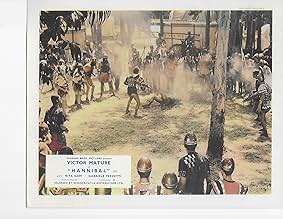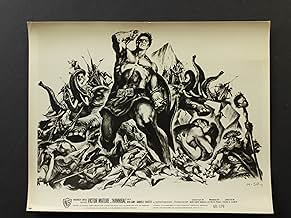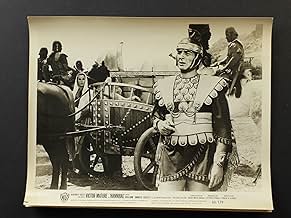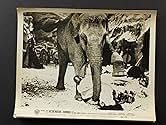AVALIAÇÃO DA IMDb
5,2/10
1,2 mil
SUA AVALIAÇÃO
Durante a Segunda Guerra Púnica em 218 A.C., o general cartaginês Hannibal ataca Roma após cruzar os Alpes com seu exército.Durante a Segunda Guerra Púnica em 218 A.C., o general cartaginês Hannibal ataca Roma após cruzar os Alpes com seu exército.Durante a Segunda Guerra Púnica em 218 A.C., o general cartaginês Hannibal ataca Roma após cruzar os Alpes com seu exército.
- Direção
- Roteiristas
- Artistas
Terence Hill
- Quintilio
- (as Mario Girotti)
Renzo Cesana
- Minucio
- (as Renato Cesana)
Bud Spencer
- Rutario
- (as Carlo Pedersoli)
Avaliações em destaque
I don't know who the hell shot this, but I suppose I could glance at the credits and lay blame on the culprits, but since I'm lazy and irritated right now I'll just skip the formality and say that Victor Mature probably fired his agent several times over after being booked for this gig.
He is quite literally the only competent person thesping his role, all the while other actors are stiff, comical, and otherwise just plain unconvincing. But like I implied in my first paragraph, it's not even the acting (however bad by the supporting cast) that's the issue: It's the cinematography: It's the direction and shot set ups: It's poor scheduling of the extras so the most can be gotten out of them shot wise. It's everything from the awful costumes to the lack of historical accuracy, to the extreme lack of consistent production values.
The battle scenes are so poorly staged that you wonder who the hell was in charge of this thing. The acting, as mentioned, by all other than the lead (Mature) is some of the worst I've seen for a feature film. It's that bad.
Avoid this thing.
He is quite literally the only competent person thesping his role, all the while other actors are stiff, comical, and otherwise just plain unconvincing. But like I implied in my first paragraph, it's not even the acting (however bad by the supporting cast) that's the issue: It's the cinematography: It's the direction and shot set ups: It's poor scheduling of the extras so the most can be gotten out of them shot wise. It's everything from the awful costumes to the lack of historical accuracy, to the extreme lack of consistent production values.
The battle scenes are so poorly staged that you wonder who the hell was in charge of this thing. The acting, as mentioned, by all other than the lead (Mature) is some of the worst I've seen for a feature film. It's that bad.
Avoid this thing.
This exciting Peplum in average budget blends historic events , drama and spectacular battles . It is an epic and fiction film released by the producer Ottavio Poggi and professionally directed by Carlo Ludovico Bragaglia and Edgar G. Ulmer . Hannibal history is imaginatively brought to life on colorful images with acceptable production values by means of hundreds of extras and spectacular shots filmed in SuperCinemascope . This cardboard costumer saga contains sword-crosses , drama and a love story between the known general badly performed by Victor Mature who falls in love with a Roman virgin played by Rita Gam , all of them abound in this moving adaptation on audacious Hannibal's existence , one of the most glorious military in the History . The Carthaginians were given the habitual all-purpose Mideastern costuming.
The actual historical deeds are the following ones : Two new powers rose to the West . On the south shore of the Mediterranean there was Chartage, a Phoenician colony grown rich on trade . On the north, there was an impressive city on the peninsula called Italy . The two were bound to collide . They did , in a series of wars called the Punic . Carthage's most extraordinary general was Hannibal (Victor Mature towards the end of his career) , who achieved the feat of attacking Rome from the north by going through Spain in crossing the Alps into Italy . At the beginning he made an oath in the presence his father, Amilcar Barca , to revenge the injustice inflicted on his country , Charthago. Amilcar had three sons , Hannibal (wooden acting by Victor Mature) , Mago (Mirko Ellis) and Asdrubal (Rik Battaglia) , both of whom gather together for battling Romans . Hannibal broke the ¨statu quo¨, as he crossed the river Ebro, the natural frontier between the Roman power and the Charthaginian and he attacked Sagunto as allied of Roma, causing the second Punic war . The mastermind Charthaginian commander going on crossing the Pyrinees and Alps with a colossal Army : 5o.ooo military, 9.ooo horses and reportedly bringing with him a corps of 37 trained elephants transported from Africa . As Hannibal's army coped with engineering problems involving elephants and Alpine streams . As he vanquished the Roman Army in several battles : Trevia (218), lake Trasimeno (217) which caused a great commotion and Rome appointed a Dictator named Favio Maximus (Gabriele Ferzetti) . Finally the Romans suffered the most great defeat : Cannas (216) . Then was appointed as General of the Roman Army , the commander Publio Cornelius Scipion who achieved to defeat the Charthaginians and he took Cartago Nova and Gades and beheaded to Asdrubal , whose head was sent his brother Hannibal . Despite the Anibal's theatrical coup de main , he was eventually beaten by Romans . While Hannibal hoped reinforcements from Chartago , Publio Cornelio Escipion the African disembarked in Africa and threatened Chartago . Then Hannibal returned to Africa for confronting Escipion . And Hannibal was ultimately defeated in Zama (202) , in spite of getting a most numbered Army . He flees and takes refuge under king Antioco III in Syria and he posteriorly committed suicide.
Other films about this famous historic character are as follows : ¨Jupiter's Darling¨ (1960) , a musical full of anachronisms with Esther Williams and Howard Keel as Hannibal, the Italian classic titled ¨Scipio Africanus : the defeat of Hannibal¨(1937) and the recent and spellbinding documentary/fiction titled ¨Hannibal" (2006) played by Alexander Siddig .
The actual historical deeds are the following ones : Two new powers rose to the West . On the south shore of the Mediterranean there was Chartage, a Phoenician colony grown rich on trade . On the north, there was an impressive city on the peninsula called Italy . The two were bound to collide . They did , in a series of wars called the Punic . Carthage's most extraordinary general was Hannibal (Victor Mature towards the end of his career) , who achieved the feat of attacking Rome from the north by going through Spain in crossing the Alps into Italy . At the beginning he made an oath in the presence his father, Amilcar Barca , to revenge the injustice inflicted on his country , Charthago. Amilcar had three sons , Hannibal (wooden acting by Victor Mature) , Mago (Mirko Ellis) and Asdrubal (Rik Battaglia) , both of whom gather together for battling Romans . Hannibal broke the ¨statu quo¨, as he crossed the river Ebro, the natural frontier between the Roman power and the Charthaginian and he attacked Sagunto as allied of Roma, causing the second Punic war . The mastermind Charthaginian commander going on crossing the Pyrinees and Alps with a colossal Army : 5o.ooo military, 9.ooo horses and reportedly bringing with him a corps of 37 trained elephants transported from Africa . As Hannibal's army coped with engineering problems involving elephants and Alpine streams . As he vanquished the Roman Army in several battles : Trevia (218), lake Trasimeno (217) which caused a great commotion and Rome appointed a Dictator named Favio Maximus (Gabriele Ferzetti) . Finally the Romans suffered the most great defeat : Cannas (216) . Then was appointed as General of the Roman Army , the commander Publio Cornelius Scipion who achieved to defeat the Charthaginians and he took Cartago Nova and Gades and beheaded to Asdrubal , whose head was sent his brother Hannibal . Despite the Anibal's theatrical coup de main , he was eventually beaten by Romans . While Hannibal hoped reinforcements from Chartago , Publio Cornelio Escipion the African disembarked in Africa and threatened Chartago . Then Hannibal returned to Africa for confronting Escipion . And Hannibal was ultimately defeated in Zama (202) , in spite of getting a most numbered Army . He flees and takes refuge under king Antioco III in Syria and he posteriorly committed suicide.
Other films about this famous historic character are as follows : ¨Jupiter's Darling¨ (1960) , a musical full of anachronisms with Esther Williams and Howard Keel as Hannibal, the Italian classic titled ¨Scipio Africanus : the defeat of Hannibal¨(1937) and the recent and spellbinding documentary/fiction titled ¨Hannibal" (2006) played by Alexander Siddig .
I've red a lot about this figure and I got to admire it; I think he was in the level of Julius Caesar and Alexander when it comes to ancient history's generals. The involving tactic he used at Cannae is still studied in Military Academies around the world. He was an extremely clever man most educated for his time and he loved his country. The Crossing of the Alps back in 200 B.C. with an army and 30 war elephants can only be qualified as epic and a true highlight in Military history.
The guy sure deserved a better try in films. Italians were never good at making epic spectacular films, but Americans did some very good products and its a pity they were never interested in Hannibal.
Edgar Ulmer's film is slow, boring and irrelevant. It starts with the crossing of the Alps and ends after Cannae; that period was precisely Hannibal's most glorious when he moved through Italy (Rome's dominions back then) at will defeating the legions four times and retiring without ever being defeated. The movie doesn't transmit at all the real significance of such a quest against the most powerful nation of the ancient world in its own soil.
Victor Mature (Hannibal) was the master of overacting and he proofs it in this picture once more moving around with his usual 60's greasy hairdo. The rest of the cast is average or below average. The battles are not very realistic and the elephants that were used as today's tanks don't even look dangerous (even if you pass over that they were Indian elephants instead of African).
Don't waste your time on this one. The great general deserves a lot more and he sure gave a lot of material for a good script.
The guy sure deserved a better try in films. Italians were never good at making epic spectacular films, but Americans did some very good products and its a pity they were never interested in Hannibal.
Edgar Ulmer's film is slow, boring and irrelevant. It starts with the crossing of the Alps and ends after Cannae; that period was precisely Hannibal's most glorious when he moved through Italy (Rome's dominions back then) at will defeating the legions four times and retiring without ever being defeated. The movie doesn't transmit at all the real significance of such a quest against the most powerful nation of the ancient world in its own soil.
Victor Mature (Hannibal) was the master of overacting and he proofs it in this picture once more moving around with his usual 60's greasy hairdo. The rest of the cast is average or below average. The battles are not very realistic and the elephants that were used as today's tanks don't even look dangerous (even if you pass over that they were Indian elephants instead of African).
Don't waste your time on this one. The great general deserves a lot more and he sure gave a lot of material for a good script.
This is one of several epic Italian productions 'supervised' by Hollywood directors - others of its ilk include THE GIANT OF MARATHON (Jacques Tourneur, 1959), Joseph AND HIS BRETHREN (Irving Rapper, 1960), THE MONGOLS (Andre' De Toth, 1961), THE THIEF OF BAGDAD (Arthur Lubin, 1961), THE WONDERS OF ALADDIN (Henry Levin, 1961) and SODOM AND GOMORRAH (Robert Aldrich, 1962); Ulmer himself served again in the same capacity on L' ATLANTIDE (1961).
As was generally the case, in spite of the participation of such noted film-makers, these spectacles displayed little directorial flair; in fact, this particular example is only distinguished from similar sword-and-sandal efforts by its above-average cast - though, to be fair, Ulmer stated in the accompanying interview on the VCI DVD that he didn't have final say on the film and, consequently, his vision was compromised by financiers who found his approach "too philosophical"! In any case, while the "elephant walk" (Hannibal famously crossed the Alps on pachyderms) and battle sequences are well enough staged, the look of the film is rather shoddy and bears evidence of budgetary restrictions. By the way, the Italian side of the directorial chores were handled by Carlo Ludovico Bragaglia - a veteran of costume pictures who would soon replace Vittorio Cottafavi on AMAZONS OF ROME (1961), after the latter fell out with leading man Louis Jourdan!
Victor Mature, himself a regular of this type of film, is ideally cast as the legendary Carthaginian warrior - though his performance is merely adequate, the script having made his character distinctly one-dimensional (where he's involved in an unconvincing and dreary romance with Rita Gam, a woman from the enemy ranks); Gabriele Ferzetti lends dignity to the proceedings as a Roman senator. A surprising presence here is that of Spaghetti Western/action-comedy icon Terence Hill (billed under his real name of Mario Girotti) - playing the key role of Ferzetti's son; according to the IMDb, his subsequent frequent on-screen partner Bud Spencer also appears in the film...but I didn't spot him!
The supplements on the VCI disc include a precious 33-minute audio interview with Ulmer (conducted by Peter Bogdanovich), which imparts several interesting bits on the production of F.W. Murnau's THE LAST LAUGH (1924) - on which Ulmer served as art director - and HANNIBAL itself; also, besides having the director enthusiastically discuss John Schlesinger's MIDNIGHT COWBOY (1969), it reveals his dislike of fellow expatriates Otto Preminger and William Dieterle!
As was generally the case, in spite of the participation of such noted film-makers, these spectacles displayed little directorial flair; in fact, this particular example is only distinguished from similar sword-and-sandal efforts by its above-average cast - though, to be fair, Ulmer stated in the accompanying interview on the VCI DVD that he didn't have final say on the film and, consequently, his vision was compromised by financiers who found his approach "too philosophical"! In any case, while the "elephant walk" (Hannibal famously crossed the Alps on pachyderms) and battle sequences are well enough staged, the look of the film is rather shoddy and bears evidence of budgetary restrictions. By the way, the Italian side of the directorial chores were handled by Carlo Ludovico Bragaglia - a veteran of costume pictures who would soon replace Vittorio Cottafavi on AMAZONS OF ROME (1961), after the latter fell out with leading man Louis Jourdan!
Victor Mature, himself a regular of this type of film, is ideally cast as the legendary Carthaginian warrior - though his performance is merely adequate, the script having made his character distinctly one-dimensional (where he's involved in an unconvincing and dreary romance with Rita Gam, a woman from the enemy ranks); Gabriele Ferzetti lends dignity to the proceedings as a Roman senator. A surprising presence here is that of Spaghetti Western/action-comedy icon Terence Hill (billed under his real name of Mario Girotti) - playing the key role of Ferzetti's son; according to the IMDb, his subsequent frequent on-screen partner Bud Spencer also appears in the film...but I didn't spot him!
The supplements on the VCI disc include a precious 33-minute audio interview with Ulmer (conducted by Peter Bogdanovich), which imparts several interesting bits on the production of F.W. Murnau's THE LAST LAUGH (1924) - on which Ulmer served as art director - and HANNIBAL itself; also, besides having the director enthusiastically discuss John Schlesinger's MIDNIGHT COWBOY (1969), it reveals his dislike of fellow expatriates Otto Preminger and William Dieterle!
"Hannibal" is a great movie for nine year-old boys, or at least it was back in 1960 when I sat through it twice at a Saturday matinée. I don't think it had much of a mainstream release, playing mostly to kiddie matinée and drive-in audiences. The film planted in me an interest in this historical period and was my first taste of cinema gore; my one memory being the blood pouring from a soldier's mouth after he was crushed by an elephant during the army's march over the alps.
In style "Hannibal" is like a really bad spaghetti western, only set it 200BC and produced by people generally clueless about just who was their target audience. On one hand the less your sophistication the less energy you will need to burn suspending disbelief. On the other hand the subject matter cries out for a more sophisticated audience interested in history. And finally the awkwardly inserted love story will go unappreciated by both sophisticated and unsophisticated viewers.
Hannibal was a brilliant military tactician from Carthage (now Tunisa) who gave Rome a run for its money as the dominant power two centuries before the birth of Christ. The film was promoted by Warner Brothers as "a fanciful adaptation of history" (make that an extremely condensed adaptation). Given all the omissions it is difficult to understand why they felt compelled to invent a love story. It might have made some sense if they had paid a box office draw actress to star as the title character's love interest; but Rita Gam was an aging bit player, pleasant in a wholesome Dorothy McGuire way but too detuned to add any sizzle to a production desperately in need of some sparks.
After an especially ponderous title sequence a narrator begins the film by getting the audience up to speed on current events (circa 200 BC). Rome is threatening Carthage and Hannibal has decided to head things off by moving his army from Spain to Northern Italy via the Alps. Then we get 15 minutes of the 40,000-man Carthaginian army making its way single file over the icy slopes. The editor cuts it shots of officers shouting, "keep moving," soldiers slipping off the path to an icy death, and the same group of elephants rounding the same fake soundstage boulder. At several points the men must pull themselves up a steep incline with a rope. There are no shots of the elephants, horses, or wagons climbing this rope and this becomes the first of many suspension of disbelief moments; it is unwise to dwell on why the soldiers are subjecting themselves to this dangerous climb since there must be a nearby Roman road for all the animals and baggage.
Hannibal's army emerges from the icy mountain and camps near the country villa of Roman Senator Fabius (Gabriele Ferzetti - despite the name this is not a girl). Fabius is in Rome futilely suggesting that they employ guerrilla warfare and avoid direct confrontation with Hannibal's army. This was in fact the way that the Romans were finally able to rid themselves of the invader but it took them several years to adopt such tactics.
Fabius' son Quintilius (Terence Hill who I've always confused with Terrance Stamp) and niece Sylvia (Rita Gam) are at the villa and Hannibal captures them. Hannibal and Sylvia have a romance and she is released to tell Rome what a big army he has and that he has only crossed the Alps because he wants peace (could have fooled me). Before you know it Hannibal has hurt his eye and Victor Mature spends the rest to the story wearing an eye patch and the Roman Senate spends its deliberations telling pirate jokes.
The elephants get inserted into several poorly edited battle sequences. They lumber around (on occasion they speed up the film to make it look like they are charging) and crush a lot of Romans off-camera and the sound people make noises that make it seem like the straw being thrown toward the elephants are actually arrows.
Then at about the one third point of the actual story they run out of film, the narrator briefly explains that Hannibal never was able to sack Rome, and the ponderous title sequence runs again but this time it is full of credits.
Mature was a horrible actor nearing the end of his career at this point. Since most of the cast are Italians whose lines were dubbed and there is no indication that anyone received acting for the camera direction, the production manages a nice lethargic unity.
Then again, what do I know? I'm only a child.
In style "Hannibal" is like a really bad spaghetti western, only set it 200BC and produced by people generally clueless about just who was their target audience. On one hand the less your sophistication the less energy you will need to burn suspending disbelief. On the other hand the subject matter cries out for a more sophisticated audience interested in history. And finally the awkwardly inserted love story will go unappreciated by both sophisticated and unsophisticated viewers.
Hannibal was a brilliant military tactician from Carthage (now Tunisa) who gave Rome a run for its money as the dominant power two centuries before the birth of Christ. The film was promoted by Warner Brothers as "a fanciful adaptation of history" (make that an extremely condensed adaptation). Given all the omissions it is difficult to understand why they felt compelled to invent a love story. It might have made some sense if they had paid a box office draw actress to star as the title character's love interest; but Rita Gam was an aging bit player, pleasant in a wholesome Dorothy McGuire way but too detuned to add any sizzle to a production desperately in need of some sparks.
After an especially ponderous title sequence a narrator begins the film by getting the audience up to speed on current events (circa 200 BC). Rome is threatening Carthage and Hannibal has decided to head things off by moving his army from Spain to Northern Italy via the Alps. Then we get 15 minutes of the 40,000-man Carthaginian army making its way single file over the icy slopes. The editor cuts it shots of officers shouting, "keep moving," soldiers slipping off the path to an icy death, and the same group of elephants rounding the same fake soundstage boulder. At several points the men must pull themselves up a steep incline with a rope. There are no shots of the elephants, horses, or wagons climbing this rope and this becomes the first of many suspension of disbelief moments; it is unwise to dwell on why the soldiers are subjecting themselves to this dangerous climb since there must be a nearby Roman road for all the animals and baggage.
Hannibal's army emerges from the icy mountain and camps near the country villa of Roman Senator Fabius (Gabriele Ferzetti - despite the name this is not a girl). Fabius is in Rome futilely suggesting that they employ guerrilla warfare and avoid direct confrontation with Hannibal's army. This was in fact the way that the Romans were finally able to rid themselves of the invader but it took them several years to adopt such tactics.
Fabius' son Quintilius (Terence Hill who I've always confused with Terrance Stamp) and niece Sylvia (Rita Gam) are at the villa and Hannibal captures them. Hannibal and Sylvia have a romance and she is released to tell Rome what a big army he has and that he has only crossed the Alps because he wants peace (could have fooled me). Before you know it Hannibal has hurt his eye and Victor Mature spends the rest to the story wearing an eye patch and the Roman Senate spends its deliberations telling pirate jokes.
The elephants get inserted into several poorly edited battle sequences. They lumber around (on occasion they speed up the film to make it look like they are charging) and crush a lot of Romans off-camera and the sound people make noises that make it seem like the straw being thrown toward the elephants are actually arrows.
Then at about the one third point of the actual story they run out of film, the narrator briefly explains that Hannibal never was able to sack Rome, and the ponderous title sequence runs again but this time it is full of credits.
Mature was a horrible actor nearing the end of his career at this point. Since most of the cast are Italians whose lines were dubbed and there is no indication that anyone received acting for the camera direction, the production manages a nice lethargic unity.
Then again, what do I know? I'm only a child.
Você sabia?
- CuriosidadesThe first film to co-star Terence Hill and Bud Spencer, and the only one where they are not the stars of the film. In fact they share no scenes and didn't actually meet until 8 years later.
- Erros de gravaçãoTowards the start of the film there is a panoramic shot of Rome. This shot includes many familiar buildings such as the Colosseum, which was not built until some 300 years after the events of the film.
- Versões alternativasThere were two different cuts of this movie in existence at the time of release. The version released originally in Italy and subsequently in Germany and maybe other non English speaking European countries had a running time of 95 minutes. The US release version is given with 103 minutes. The BBFC lists a submitted running time of 104m 40s.
- ConexõesEdited into Ibiza: The Silent Movie (2019)
Principais escolhas
Faça login para avaliar e ver a lista de recomendações personalizadas
- How long is Hannibal?Fornecido pela Alexa
- What are the differences between the Italian Version and the US Version?
Detalhes
Bilheteria
- Orçamento
- US$ 4.000.000 (estimativa)
- Tempo de duração1 hora 40 minutos
- Proporção
- 2.35 : 1
Contribua para esta página
Sugerir uma alteração ou adicionar conteúdo ausente

Principal brecha
By what name was Aníbal, O Conquistador (1959) officially released in India in English?
Responda

